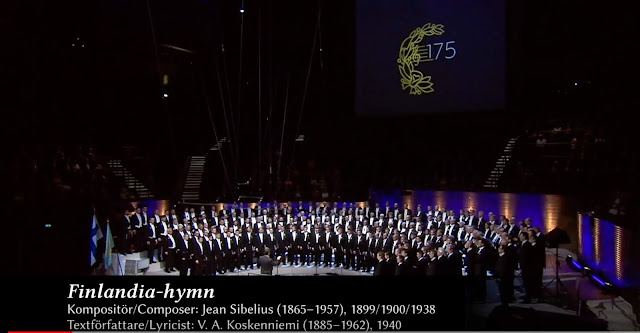Oi Suomi, katso, sinun päiväs koittaa
Yön uhka karkoitettu on jo pois
Ja aamun kiuru kirkkaudessa soittaa
Kuin itse taivahan kansi sois
Yön vallat aamun valkeus jo voittaa
Sun päiväs koittaa, oi synnyinmaa
Oi nouse, Suomi, nosta korkealle
Pääs seppelöimä suurten muistojen
Oi nouse, Suomi, näytit maailmalle
Sa että karkoitit orjuuden
Ja ettet taipunut sa sorron alle
On aamus alkanut, synnyinmaa
V.A. Koskenniemi
V.A. Koskenniemi
~~~~~
Oh, Finland, behold, thy day now is dawning,
The threat of night has been dispelled.
The skylark calls across the light of morning,
As if the firmament itself reverberates.
The light of day now conquers the powers of night
Thy day is dawning, Oh, Fatherland!
Oh, arise, Finland, raise up high
Thy head crowned with grand memories.
Oh, arise, Finland, thou hast shown the world
That thou hast thrown off slavery,
And not succombed beneath oppression's yoke.
Thy morning has commenced, Oh, Fatherland!
~~~~~
Growing up in Finland in the middle of last century, every child understood the sacrifices that our armies had made to leave us a free, independent homeland. Much of the teaching came from patriotic music: songs that we knew by heart from first grade on. One such "musical teacher" was Jean Sibelius' tone poem Finlandia, or Suomi. Oh, the thrill and fervor even the youngest heart felt right from the first discordant measure of the majestic orchestral sound. And then, after the battle of the brass, as if echoing the sounds of war, a calm, reassuring harmony made way for the resolution of conflict that would end the long-lived oppression. This is why every Finn beams with patriotism when he hears this majestic music.
Originally, there was no text to the hymn section of Jean Sibelius' Finlandia; for 40 years Sibelius successfully resisted attempts of many to write such libretto. Finally, in 1940, Veikko A. Koskenniemi’s creation was acceptable to Sibelius, and the nod was given to go ahead and officially include the poetry. The events in Finnish history lead to this text and its acceptance by the Maestro.
1940 was a seminal time in Finland’s history. On 30 November 1939, Russia invaded Finland, and thus commenced the infamous Winter War (three months after the outbreak of World War II). Finland fought courageously in the freezing winter weather, and the enemy was no match in the snowy fields of Finland. The conflict ended with the signing of the Moscow Peace Treaty on 13 March 1940.
At this noteworthy moment, the culmination of Finland’s strivings for complete independence, Sibelius and Koskenniemi combined their artistic strength resulting in the declaration of victory, “Thy morning has commenced, Oh, Fatherland!”
It may also be important to note the original occasion for which Sibelius composed his tone poem Finlandia—the Press Celebrations of 1899, a covert protest against increasing censorship from the Russian Empire. The symphonic tone poem was the last of seven pieces performed as accompaniment to tableaux depicting episodes from Finnish history. Sibelius’ composition caused passionate patriotism to the point of raising riots, which lead Russia to ban its subsequent perfomances. However, Finlandia was included in concert programs under various alias titles.
Most of the tone poem is taken up with rousing and turbulent music, evoking the national struggle of the Finnish people. Towards the end, a calm comes over the orchestra, and the serenly melodic Hymn is heard. It still arouses strong patriotic feelings in Finnish hearts.
Most of the tone poem is taken up with rousing and turbulent music, evoking the national struggle of the Finnish people. Towards the end, a calm comes over the orchestra, and the serenly melodic Hymn is heard. It still arouses strong patriotic feelings in Finnish hearts.
I hope the reader will understand why it is hard for me to hear the hymn section set to foreign words, and why this is the only way this beautiful hymn ought to be heard:





No comments:
Post a Comment